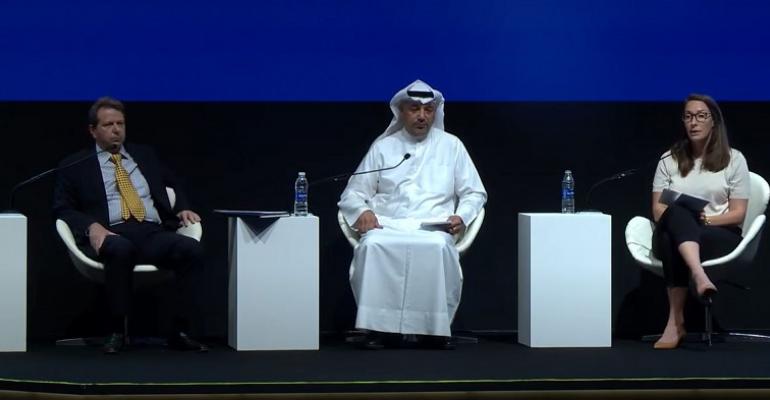Speaking yesterday at a Seatrade Maritime Middle East session on ‘The Difficult Journey to Zero-carbon Shipping’, Mathiassen noted new sustainability criteria relating to finance, and highlighted specifically the impact of initiatives such as the Poseidon Principles.
Starting out with just three banks, no fewer than 28 finance institutions active in shipping had now signed up to the Poseidon Principles, he said, which set out a framework for the climate alignment of loan portfolios and potential investments in energy-related sea transport. The banks and finance houses now account for a total of about $185 billion of shipping finance, he said.
“I’ve noticed a change in attitude with banks for financing crude oil tankers, for example,” Mathiassen revealed. “It’s much more attractive to be associated with financing wind farm installations vessels. We’ve seen a number of IPOs in that sector where it’s oversubscribed in ten minutes. It’s a sign of the times … we’re struggling now to get finance for certain projects that I’m currently working on. Banks are no longer so keen on financing oil storage or transport.”
Other participants on the panel included Ali Shebab, DNV’s head of Middle East and African business, who recently joined the classification society following a long career at the Kuwait Oil Tanker Company, and Panos Koutsourakis, ABS Director, Sustainability Strategy, who took part remotely from Singapore.
The fourth presenter, Ida Fredriksson, who heads Stena Bulk’s Dubai setup, was much more upbeat. “Sustainability is about the environment, yes,” she declared, “but it’s also about making sure that people all around the world can heat their homes, have food to eat, and can get to work. Our philosophy is to engage in the development of future fuels whilst still continuing to transport oil in the most sustainable way as long as the world needs it.”
Fredriksson revealed Stena Bulk’s initiatives in adopting sustainable strategies in oil transport today. The company now offers customers biofuel offsets, she said, and will be commissioning dual-fuel methanol tankers in 2022. Meanwhile, developments in carbon capture technology and wind power are being assessed.
“We have ambitious targets,” Fredriksson told delegates, revealing that the company aims to have a series of ‘zero-emission-ready’ ships on the water by 2035, a carbon-neutral corporate operation by 2040, and ten years later, by the middle of the decade, a net-zero emissions business including cargoes that are shipped. Investment in technology is considered by the company to be a progressive step that will drive further commercial success, she said.
Copyright © 2024. All rights reserved. Seatrade, a trading name of Informa Markets (UK) Limited.
Add Seatrade Maritime News to your Google News feed.  |


